Merlin: Exclusive Interviews with the Entire Cast

The BBC's Merlin makes its second season debut on the Syfy Channel on April 2nd, and Earths Mightiest has interviews with the entire cast.
A series created for England's BBC, it has garnered a powerful international following and promises to do the same in America as it traces the evolution of the wizard Merlin, exploring how an angst-filled teenager will ultimately take his place alongside King Arthur of Camelot.
Johnny Caps, who co-created the show with Julian Murphy, notes that the duo's creative pleasure comes from developing high-concept shows, such as this one and the previously-produced British series Hex. "To us, it's the ultimate challenge as program makers and creators," he explains. "With naturalistic drama, you sort of take the camera outside and there you are, but with high-concept and period shows, you have to create a new world and the rules of that world."
The writing pair began exploring different mythologies in literature and legend that could serve as the basis of a different kind of TV show. Appealing to them was the Arthurian myth and Merlin.
"From there," Caps says, "we came up with the idea of a story about a young Merlin that would allow us to spin stories around a young boy who realizes he's different and has superpowers, like Spider-Man and so on. Then we thought if we have a young Merlin, why don't we bring in young Arthur and have Prince Arthur rather than King Arthur of legend? I've been a huge Smallville fan, and I thought it was so clever how they subverted the expectations of all of those characters. We realized we had this rich mythology of Morgana, of Guinevere, of Arthur, of Merlin, and we thought, 'Why not bring all of those characters in and let's start the story before the legend began?' The story snowballed from there. We have young Arthur who is not the king of legend. Instead, he's this young, kind of sporty guy, bit of an idiot, basically, but he has the potential to be a great king.
"Then," he adds, "we said, 'Let's have Guinevere as a young serving girl. The audience knows she's to be Queen of England at some point, but they'll be intrigued as to what her journey will be to get there.’ So we started playing around with that and it felt really good. So we developed four or five scripts, fine-tuning that concept and then later on we thought, 'Why doesn't Merlin exist in a world where magic is banished? So everything he does he has to do secretly.' All of this happened over a year or two years. It kept on improving and it felt right."
COLIN MORGAN
(MERLIN)
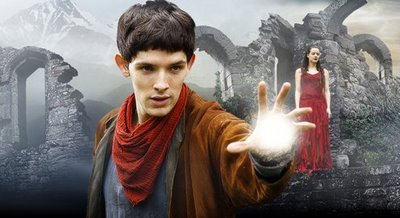
“The fact is, we’re on our third season and the stories are getting better and better. When you’re genuinely excited about coming in to work each day and getting a chance to work with great people on great stories, you can’t really complain.”
“The show is obviously taking the Arthurian legend and the concept of Merlin and Arthur as so young is a new idea to explore and you might think, ‘Hmm, how is that going to work?’ But it does, of course. I n a way, the audience is in the know, most people know elements of the legend, but we’re seeing all of these relevant characters in different and unexpected ways. What’s fresh, too, is the setting is a world where anything can happen, where magic does exist and there are some nasty creatures. You can really go anywhere with that. Every episode is different from the next; you can have a really funny episode followed by a very serious one. As the show goes on, it definitely seems to get a bit darker, but still keeping the charm and humor that the show has as well.”
“I think Merlin, when he first arrives in Camelot, is very wide-eyed and innocent. He’s come to this massive city, this empire, and the one thing he is good at, magic, and that he has a natural ability for and he can really be himself, is banned under penalty of death and that’s a huge shock for him. And then he is also realizing his destiny to bring Arthur to the throne. Merlin and Årthur don’t get off to a good start, but it is interesting to see how their relationship develops. There’s all these characters who we know their destinies are intertwined and we know it is Merlin’s destiny to bring Arthur to the throne, and it’s interesting to see how Merlin then accepts that, the mistakes he makes along the way, the adventures that he undertakes, and the friends that he makes and those that he loses, and the people that he battles. I think it says a lot about Merlin as a character that he takes all of this on, accepts it and deals with it to the best of his ability. Then he’s got a natural curiosity and genuine enthusiasm that pulls him through and makes him determined.”
“I think some of the most interesting things is to see Merlin with really high moral dilemmas when friends are in peril. I think as Merlin learns to accept his destiny, becomes more powerful and takes it upon himself to take his role further and develop his powers, I think the more powerful he becomes, the better the results are going to be. I think as much as his power increases, I think it’s going to all be interesting to play.”
RICHARD WILSON
(GAIUS)
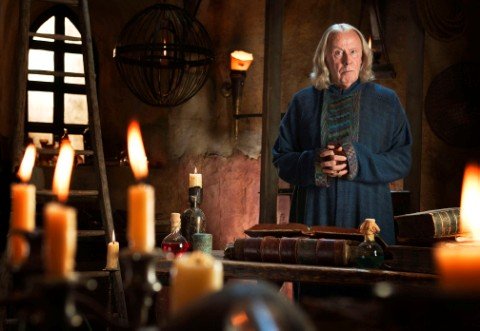
“I haven’t been very into the Arthurian legend, though of course I’ve looked into it since I’ve been on the show. The interesting thing about our show is that it’s a prequel and they can make up history as they wish. My character, Gaius, has a bit of a dark past. As you know, magic is banned in Camelot by Uther. Although he tries to control Merlin and get him out of doing magic, he himself had a very murky past and a very wicked mentor and became very involved with magic himself before giving it up. So our history is made up, which provides many dramatic storylines.”
“I think one of the strengths of our show is the production values. They’ve spent a lot of money on music, too, so the whole look of the package is terribly important, I think. And the idea of the show is that it’s aimed at a children’s audience, but good enough for adults to watch with them. It’s actually quite scary at times for kids, which is quite exciting.”
“I think Gaius takes on the task of looking after Merlin, thinking it’s going to be very easy and then he begins to realize that his magic is something special. He also begins to realize that Merlin is destined for greater things, that he is going to be the protector of and care for Arthur. That grows. Whereas Gaius tries to get Merlin to stop doing magic, there are many times when the only way out is using magic and I tell him to use it. So it’s quite a complicated relationship, but what I think happens eventually is that the two of them bond tremendously and Gaius looks upon Merlin as the child he never had.”
ANGEL COULBY
(GWEN)
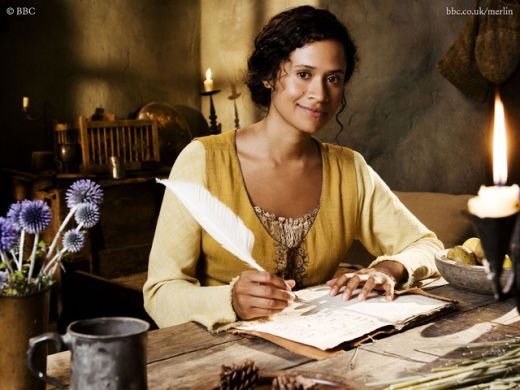
“I’ve always enjoyed the stories of the Knights of the Round Table and Camelot. A few years ago I saw a BBC version of Merlin and I was very enchanted by it and I thought, ‘I would love to play Guinevere somewhere.’ Then this came along and the script was fantastic.”
“It’s a pleasure to become synonymous that a role that everyone is aware of, but also being able to bring your own flavor into it. There were preconceptions of who Guinevere was, but obviously we’re reimagining everything and we have a bit of free reign to do whatever we like with the characters. As this is a prequel, we can open it up to new ideas as long as they eventually get to the place they need to be. I’m enjoying the journey of it all.”
“Obviously she’s been seen as a great noblewoman, and I definitely feel that my Guinevere is noble, but she begins as a humble serving girl in the castle. She’s incredibly kind and shy, hence she’s a good inn keeper as much as possible and would never imagine that she would ever be desired by Arthur. At the beginning of the series, she has a little crush on Merlin, but she gets very embarrassed over the idea and would never admit it. Obviously we know she ends up marrying Arthur and having an affair with Lancelot. You wouldn’t think that of her. But you can see the inner queen at times when she stands up for what she believes in, which is the importance of everybody having a voice, not just the nobility but the ordinary people as well.”
“She always sees the good in everybody. I think in the beginning she’s kind of shy and retiring, but by the end I think she’s a lot stronger. Definitely. You can see her growing into a woman from a girl.”
BRADLEY JAMES
(ARTHUR)
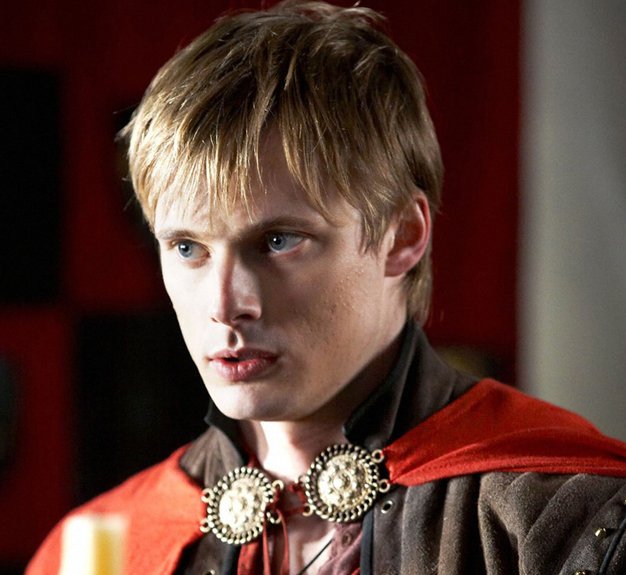
“I get to go to work and swing a sword around all day, I get to ride horses and fight mythical creatures. I can’t really complain.”
“I always say that Arthur is incredibly misunderstood, but then again I’m biased. With Arthur, he’s got a huge responsibility and a large amount of pressure is put on him by his father, the king. He is a prince and he has a certain standard he must uphold. It sometimes brings out a behavior in him in certain ways – for example, when people like Merlin come along, they clash, because Arthur isn’t afraid to act like a an idiot because he’s aware of the social aspects of his position, and how people SHOULD see him. Yet beneath all of that, and the reason I say he’s misunderstood, is that he’s aware of right and wrong, it just takes him quite a while to figure it out, really.”
“The biggest pressure he puts on himself is to prove himself to his father. He’s grown up without a mother, so he’s emotionally a bit stunted in that sense. His father isn’t the most sensitive of men; he’s a sort of tyrannical ruler, if you will. That is what Arthur has his standard set by, but because he has his underlying idea of what should be, there’s always that conflict. I think Merlin coming into the fold is always that little voice on the shoulder; the angel and the devil on each shoulder, telling him different things, being Merlin and Uther, and he has to decide what he’s going to do. We’re all aware of the man he will become and the show is hinting towards the direction he’s going to take to get there. When we first see him, it seems like he’s got quite a long way to go.”
“I kind of describe Arthur as the Medieval sportsman. I myself have always been interested in sports, so it’s perfect for me because, like I said, I get to horse ride, I’ve done rock climbing, we’ve just done some jousting. It’s all so terrific to do.”
“The visual effects are something different to work with. As opposed to being chased by Griffins and snakes and things as seen on screen, what happens is I get chased by ping pong balls and blue bags, which isn’t quite as terrifying as huge mythical creatures. It’s a case of letting your imagination being as vivid as possible and not thinking about it. I’ve had some directors who have helped me out with that stuff.”
“I was given a relatively broad starting point to kind of begin the series. I think we all appreciated the clean slate we were given to start off with. Arthur begins brash and insensitive and other negative words for him, but at the same time he’s always been brave and loyal, I think. Through the course of the series, he’s got this guy coming into his life, Merlin, who just strangely seems to be involved with everything. Arthur finds himself having to listen to Merlin’s guidance at times, even though they start off not getting on. He suddenly starts to learn the value of Merlin, and that is the catalyst for his change, his evolution through the series. We start to see more signs of the man he will become through a series of events, life or death events in this case. He learns more and more each time about himself, about the value of people and I think all the while through that he’s aware that he’s going to be king one day and his father is setting up an example, and it’s up to him as to whether he follows that example or if he stays away from that and isn’t fixed into the way he has been taught. It’s a slow-burner with him becoming aware of how intertwined his destiny is with Merlin, but certainly he starts to learn the value of him a lot more.”
ANTHONY STEWART HEAD
(UTHER)
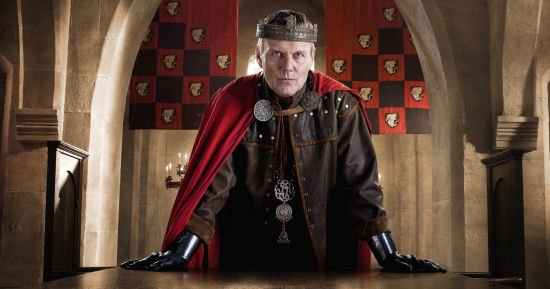
“There’s a wry smile throughout all this because you’re observing something that you know what the eventual outcome is. You want to know how it got to that point. It’s a different journey from something where you’re surprised by the outcome of the events. EVERYBODY knows the outcome: Arthur married Guinevere, then Lancelot turned up, screwed everything up, then Mordred got involved. There are elements, because it’s a family show, we aren’t dealing with.”
“I’m not a bad guy on the show. People come up to me on the streets and claim that I am, but I’m not. If you think about it logically, you have a famine. Arthur says that the supplies are running out and I say, ‘We’ll stop giving it to the people and save it for the army.’ He says, ‘What are you talking about?’ ‘We’ve got to have an army.’ ‘What’s the point? If we haven’t got a kingdom to protect, what’s the point of an army?’ ‘You cannot let your army die, then we’ll be invaded and overrun.’ To Uther this makes perfect sense, but it makes him out to be this terrible man who cares about his army more than his people. But things like that make it a much more interesting character to play, that everything that I do comes out of a realism and necessity. It’s a very tenuous time.”
“He feels strongly about anybody practicing magic, because as far as he’s concerned, they cannot differentiate between good magic and bad magic. Anybody that practices magic, is automatically drawn to the dark side. Which makes perfect sense, in which case stamp them out, eradicate, get rid of them, because they won’t be able to help themselves. And you’re living in times when the only way to vanquish them was to cut their heads off. By his very nature, he’s the protagonist, the catalyst that enables our world to turn, because without him, without conflict, there would be nothing to actually create the situations that Merlin finds himself in. The fact that what he does it elicit, the fact that Merlin is an outlaw inside this world, makes for an interesting tale.”
KATIE MCGRATH
(MORGANA)
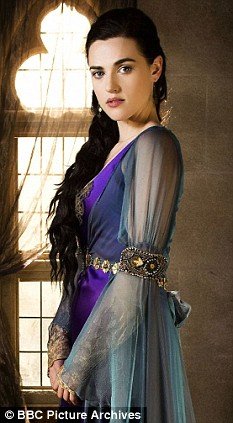
“The great thing about my character is she’s a very modern interpretation of a period woman; a modern mind in a period body. She’s got sass and moxie and all of that, but at the same time, she’s still a lady. Which makes her more fun to play. She’s not what you expect.”
“I think we’ve grown along with the characters. As the writers get to know you and your own strength, they sort of bring bits of that out. As you settle into the character, you find who she is and the best way of playing her. That’s definitely happened. We’re doing the third season now, and if I look at where I was this time a year ago, I’m much more self-assured when I’m in work. I know where I am, I’ve built on 26 episodes already and we’ve got that kind of confidence to come in and try different things. As a character, it moves them on, it’s an evolution. You can’t be the same person you were the first episode, that’s just boring. People in real life change, and your character should change along with that and reflect it. I think on TV you inhabit who you’re playing much more than you do in a film.”
“I’d like her to become badass in the future. It’s so much more fun to play a bitch than a nice girl. Before I auditioned or anything, I read about it and I remember saying to my mom, ‘I don’t want to be Guinevere. I don’t want to be the beautiful future queen. If I could play anyone, it would be Morgan la Fey, because she’s dark and there’s a battle going on inside her between good and evil, which is much more interesting. So, for me, the more badass and evil she becomes, the more I like it. If they can continue down the path they’re going, I’ll be happy.”
|
11
|

|
|
1
|

|
|
|
EdGross
4/2/2010